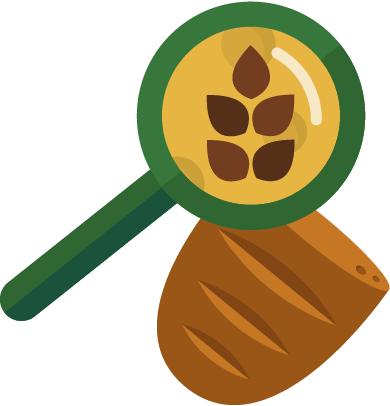Adding whole grains to our daily meals is a simple way to improve our nutrition, keep ourselves healthy, and even help the planet. Here are five reasons to make the switch to whole grains today.
Whole grains are packed with essential nutrients that keep us feeling good. They’re loaded with B vitamins (like thiamine, riboflavin, niacin, and folate), which help boost energy, support brain function, and keep your metabolism ticking along. Plus, whole grains are rich in minerals like iron, magnesium, selenium, potassium, phosphorus, zinc, and copper. These minerals are key players in keeping our bones and teeth strong, balancing our bodies’ fluids, helping nutrients move in and out of our cells, and keeping our metabolism and immune system in check.1,2
Did you know that whole-grain foods can have up to 75% more nutrients than refined grains?3 For example, a serving (75 g) of (uncooked) whole wheat pasta gives you 29% of your daily niacin (vitamin B3), 33% of your thiamine (vitamin B1), and 24% of your magnesium needs. Compare that to white, refined pasta, which only offers 9%, 7%, and 11% of those same nutrients!4,5




One of the great things about whole grains is their high fibre content. Fibre is a type of carbohydrate that is found in plant-based foods and cannot be completely broken down in our gut.6
Fibre is good for us because it aids digestion and helps protect against chronic diseases like type 2 diabetes, colorectal cancer, and cardiovascular diseases like heart disease and stroke. It’s recommended to eat at least 25 grams of fibre a day.7 Replacing refined grains with whole grains in your meals is an easy way to up your fibre intake and get closer to this target. Just by switching out one slice of white bread for whole grain bread, you can add an extra 6 grams of fibre to your meal!
Regularly eating whole grains is linked with a lower risk of several chronic diseases. Not getting enough of them is actually one of the top reasons for poor health in Europe. In fact, back in 2019, it was estimated that a low intake of whole grains was linked to nearly 215,000 preventable deaths and over 3.5 million years of life lost due to ill-health, disability, or early deaths – over 170,000 of those were due to cardiovascular-related deaths.8
So, why are whole grains such a big deal? Well, a high intake of whole grains has been associated with a decreased risk of developing and decreased risk of death from diseases such as colorectal cancer, cardiovascular disease, and type 2 diabetes. Plus, whole grains help with weight management. Why, you might ask? The magic is in the antioxidants, dietary fibre, and other bioactive compounds found in whole grains. These not only help regulate blood sugar and insulin levels, but also keep you feeling full longer and help reduce risk factors like high cholesterol and high blood pressure.9




Whole grains also beat refined grains in the eco-friendly department for other reasons. Since more of the grain stays intact during processing, less gets thrown away, and you get more food from the same amount of land. For example, a bushel of wheat can make 60 loaves of whole grain bread but only 42 loaves of white bread. Plus, some whole grains like millet and teff are resilient – they can handle extreme weather conditions and thrive in droughts. They’re also great for the soil. Planting whole grains like barley, oats, and rye in the off-season can prevent soil erosion and add nutrients back into the ground.11


1.
Bender A.D. 2015. Micronutrients: Vitamins & Minerals. In: Rodwell, W.V., Bender, A.D., Botham, M.K., Kennelly, J.P. and Weil, A. P. 2015. Harper’s Illustrated Biochemistry. 30th edition. McGraw-Hill Education, pp 546-563.
2.
World Health Organization (WHO). 2004. Vitamin and mineral requirements in human nutrition. 2nd edition. Geneva, Switzerland: WHO.
6.
Stephen AM, Champ MM, Cloran SJ, Fleith M, Van Lieshout, L, Mejborn H et al. (2017) Dietary fibre in Europe: Current state of knowledge on definitions, sources, recommendations, intakes and relationships to health. Nutr. Res. Rev. 30 (2):149-90
9.
Milani, P., Torres-Aguilar, P., Hamaker, B., Manary, M., Abushamma, S., Laar, A., … & Taylor, J. (2022). The whole grain manifesto: from green revolution to grain evolution. Global Food Security, 34, 100649.
10.
Clark, M. A., Springmann, M., Hill, J., & Tilman, D. (2019). Multiple health and environmental impacts of foods. Proceedings of the National Academy of Sciences, 116(46), 23357-23362.
Learn to identify whole grain products, cook delicious meals, find practical tips for a smooth, gradual switch, and much more!